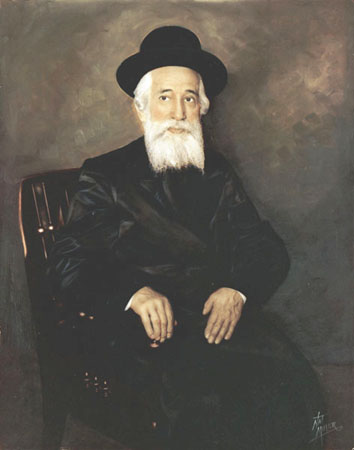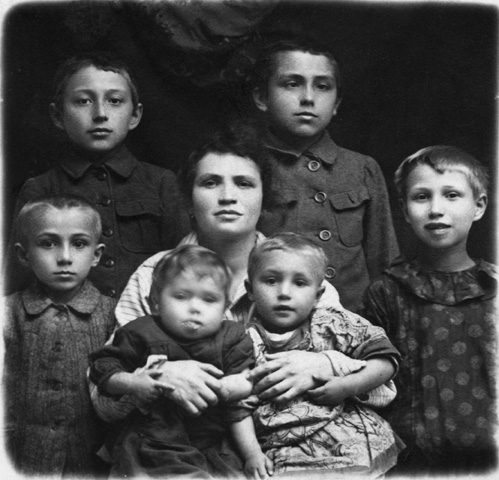THE ZVILLER REBBE

|
GRAND RABBI JACOB ISRAEL KORFF: THE ZVILLER REBBE |
|
|
|
|
Rabbi Korff’s wisdom, courage, and leadership qualities earned him the allegiance of thousands of followers. Because of his popularity and many years of service in Zvil, he retained the title, "Der Zviller Rebbe" even after he moved to America. |
According to Rabbi KORFF’s grandson, Joe Korff, Gittel's children did not like to talk about the pogrom in which their mother was killed. The version he did hear from his father, Rabbi Samuel Korff, who was eight at the time, was somewhat different from Baruch's memory. Joe recalled:
"I asked my father once how my grandmother had died. I asked who had killed her--the White Russians or the Red Russians [Bolsheviks]. And he said it didn't really matter, both groups were equally bad to the Jews. But it may have been the White Russians. She was taken up against a wall and shot. He was eight years old at the time, the oldest of his brothers and sister, and he said that Gittel died in his arms."
Click here to read about Rabbi Jacob Korff’s arrest.
In the end, the exact way that Gittel died was less important than the fact that her family was bereft. Now, Rabbi Jacob Korff had not only the responsibilities of the Jewish community to absorb his time, but he also was the caretaker of four young children. Clearly, he needed a wife to help him fulfill his family obligations.
In June 1921, nearly two years
after his wife's murder, Jacob took his sister-in-law, Yocheved (Etta) Goldman,
to be his bride. A year later, Etta gave birth in Korets to a daughter, Chasse
(Betty Korff Berkovitz), the first of five children from this marriage.
Click here to learn about more about Rabbi Korff’s wives.
While Rabbi Korff was busy in Zvil helping the Jewish community to weather the
effects of World War I, many of his followers had established themselves in
America. By 1924, they had saved enough money to pay for the rabbi’s passage. He
sailed alone from South Hampton, England, on the S.S. Majestic and
arrived in New York on June 18, 1924.[1]
His followers settled him in Dorchester, Massachusetts.
|
|
|
This is the S.S. Majestic, the ship that took Rabbi Korff to America. At the time that it was built, the Majestic was the world’s largest ship, weighing 56,621 tons and measuring 956 feet long. |
Immediately, Grand Rabbi Korff sent for his wife and children but Etta, pregnant again, refused to travel; therefore their second child, Max Korff, was born in Poland later that year. Because she did not travel to America right away, Etta and the children lost their visa. They then moved to Warsaw, where they stayed for about three years. According to the rebbe’s eldest daughter, Adele Korff Gass, who remembered that time, the family "lived in a comfortable apartment, and was not wanting for anything because [my father’s] supporters sent money."
 |
|
Etta and the children Caption: Etta (center) Samuel Korff (back far-right) and siblings (clockwise) Adele, Nathan, Max, Betty, and Baruch. The children of Gittel never accepted Etta as their new mother, addressing her as “Auntie,” not as “mother.” |
Two years later, Grand Rabbi Korff sent some people to Europe to arrange passage for Etta and the six children. The family traveled to America with their own suite of rooms on the S.S. Samaria and their own private kosher dining room. When they arrived in Dorchester they were treated like royalty. The streets were closed and there was a cortege of cars--a real parade. In America, Jacob and Etta had three more children: Molly, born in 1927, Martin, born in 1929, and Pauline, born in 1930.
Rabbi Jacob Korff became a U.S. citizen on November 9, 1931,[2] and his foreign-born children were granted citizenship through him. Etta was naturalized more than 20 years later on December 7, 1953.[3]
The rebbe was not a rich man but he saved up a few thousand dollars and purchased a large house at 163 Woodrow Avenue in Dorchester--to provide a home for his family and a place for people who had nowhere else to go. Although his children often did without, he provided a safety net for the community. Anybody who needed help came to him. Jacob, like all grand rabbis, was a lawyer, teacher, judge, and therapist all rolled into one. And like most rabbis, Rabbi Jacob Korff did not abuse this power; however, he never performed a wedding ceremony unless he knew the participants from childhood, and he never granted divorces.
 |
|
Rabbi Korff's altruism was part of his heritage. In rabbinical families it was a tradition not to live for one's self but to help others. The Rebbe's house was always filled with people--rich and poor alike. They came to hear every word of wisdom that he could offer them. If they needed a meal, he provided it. If they needed clothing, he gave it. The children gave up their beds and cots lined the attic so people without a bed could find shelter for the night.
When people came to Rabbi Korff for advice or legal matters, they left money. He used this money to meet the needs of the poor. His daughter, Adele, once wanted to replace the rebbe’s worn kaputta (long coat) but he refused because he rarely spent money on himself.
Rabbi Korff’s good deeds were listed in the press release distributed during his final illness:
"During all his years of service to G-d and man, Grand Rabbi Korff set up before himself certain personal rules of conduct. First, he never expended a dollar unless he had first set aside ten percent for charitable and religious purposes. This is in keeping with the Biblical tradition of the tithe or ma'aser. Second, his table is free to all in need. Wealthy guests who have come for the rabbi's advice rub shoulders with unfortunates who sit at the table for a handout. Scholars and laymen, rich and poor are treated alike.[4]
 |
|
|
Click here to listen to Adele Korff Gass explanation of her father’s generosity. (Recorded November 9, 1992 in Winthrop, Massachusetts) |
[1] Documentation to be supplied.
[2] 1926-1966 U.S. District Court Boston Naturalizations Index, admitted 9 Nov 1931; Petition #133709; U.S. District Court Boston; National Archives, New England Region, Trapelo Rd, Waltham, MA. Witnesses: Jacob Kardonick, cantor, and Izzo Goray Glickstein, cantor.
[3] 1926-1966 U.S. District Court Boston Naturalizations Index, admitted 7 Dec 1953; Petition #316795 ; U.S. District Court Boston; National Archives, New England Region, Trapelo Rd, Waltham, MA. Witnesses: Barney Gittleman and Aron Baru.
[4] 1952 Press Release